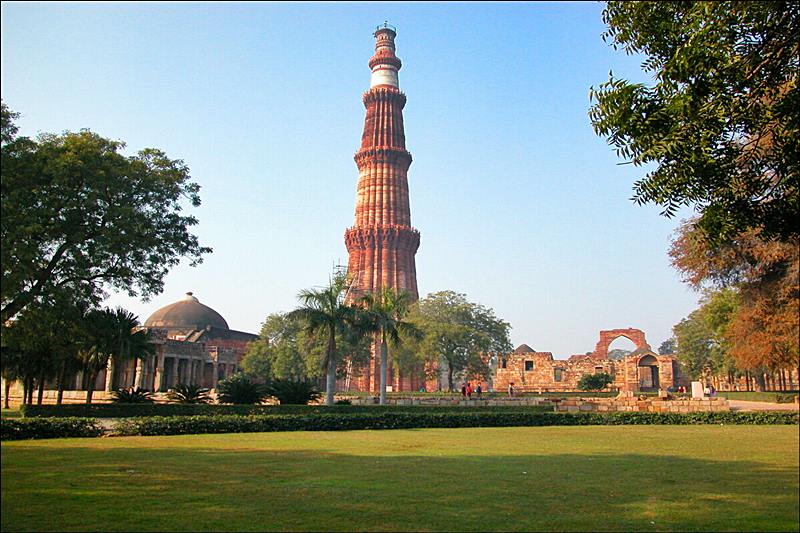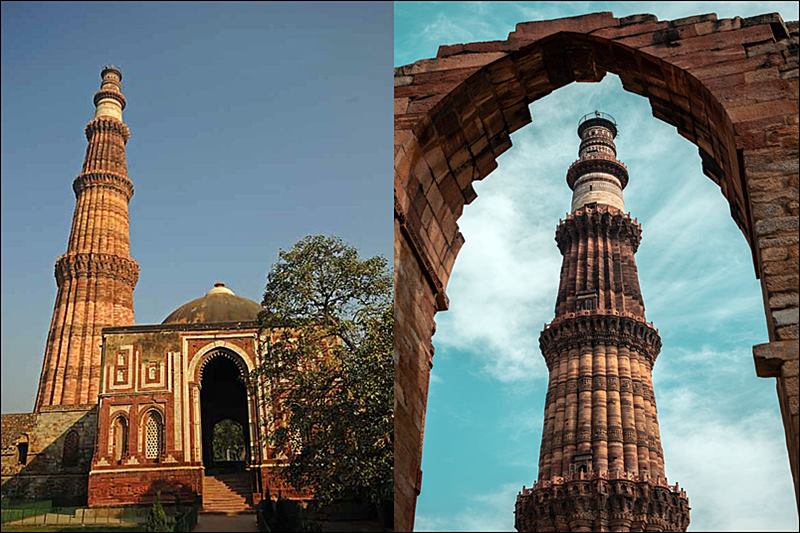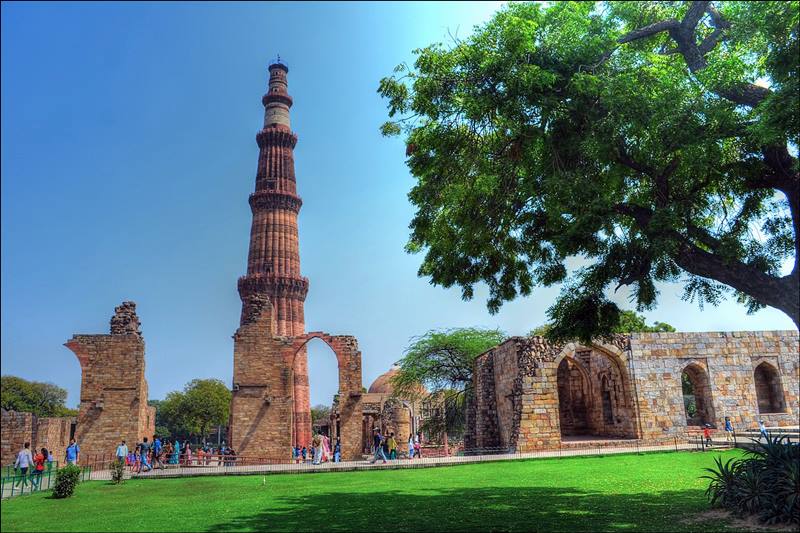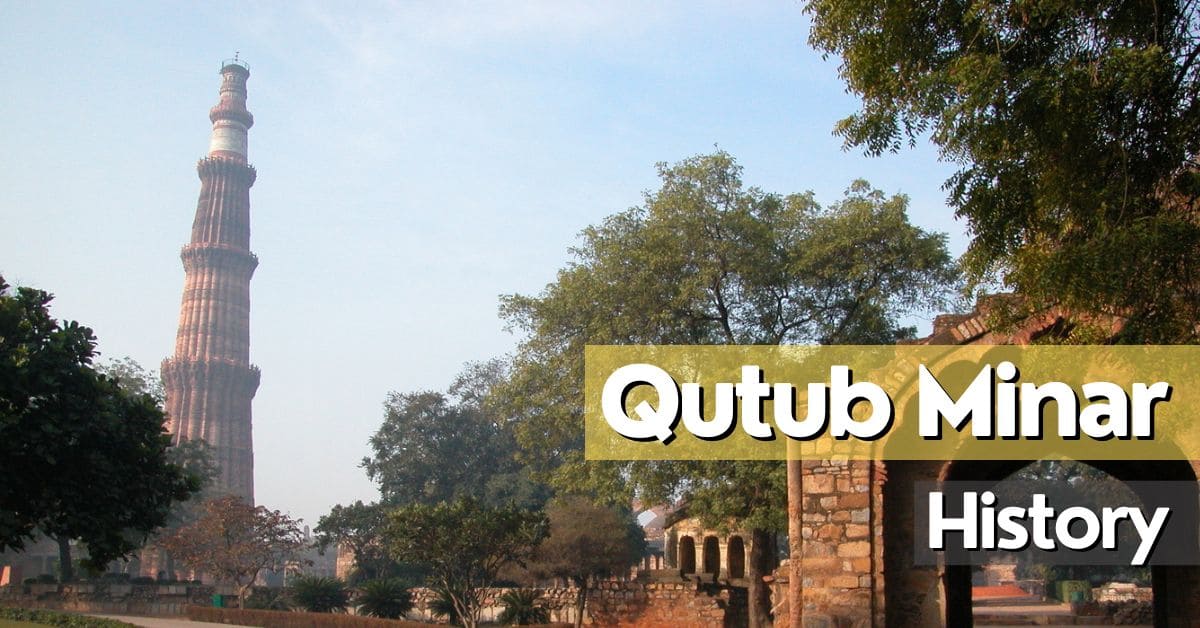कुतुब मीनार को देखने के लिए लोग देश विदेश से दिल्ली आते हैं। दिल्ली में स्तिथ क़ुतुब मीनार मुस्लिम शासन काल के सुनहरे समय का एक प्रतीक हैं। इसकी अद्भुत वास्तुकला और सौंदर्य लोगों का मन मोह लेती हैं। यदि आप इस मीनार के बनने का इतिहास जनना चाहते है,तो ये लेख आपके लिए हैं। क्योंकि आपको इस लेख में Qutub Minar History के बारे में जानने को मिलेगा। कुतुब मीनार के बनने का इतिहास भी ख़ास है। क्योंकि इसका निर्माण शुरू किसी और ने करवाया था और इसे पूरा किसी और ने करवाया था।
Qutub Minar History

कुतुब मीनार एक वर्ल्ड हेरिटेज साइट है। और ये दिल्ली के प्रसिद्ध इमारतों में से एक हैं। कुतुब मीनार का निर्माण लाल कोट के खंडहरों पर किया गया है।
इस मीनार का निर्माण दिल्ली के आखिरी हिन्दू शासक को हराने की खुशी और दिल्ली में मुस्लिम ताकत को दिखाने के लिए बनवाया गया था।
कुतुब मीनार के निर्माण का कार्य दिल्ली सल्तनत के संस्थापक कुतुबुद्दीन ऐबक ने शुरू करवाया था। कुतुब मीनार काम्प्लेक्स की स्थापना 1193 में हुई थी। और 1199 में कुतुबुद्दीन ऐबक ने कुतुब मीनार की पहली मंजिल का निर्माण कार्य शुरू करवा दिया।
हालाँकि कुतुबुद्दीन ऐबक अपने समय में सिर्फ इस इमारत की पहली मंजिल ही बनवा पाया था। ऐसा माना जाता है की कुतुब मीनर का नाम कुतुबुद्दीन ऐबक के ऊपर रखा गया है।
लेकिन ऐसा भी हो सकता है की इसका नाम 13वीं सदी के सूफी संत ख्वाजा कुतुबुद्दीन बख्तियार काकी के नाम पर रखा गया हो। क्योंकि शम्सुद्दीन इल्तुतमिश उनको बहुत मानते थे।
कुतुबुद्दीन ऐबक के बाद दिल्ली सल्तनत के अगले सुल्तान शम्सुद्दीन इल्तुतमिश ने इस इमारत में 1220 तक तीन नई मंजिले और बनवा दी। शम्सुद्दीन इल्तुतमिश कुतुबुद्दीन ऐबक के दामाद थे।
1369 में बिजली गिरने के कारण मीनार की सबसे ऊपर की मंजिल छतिग्रस्त हो गई थी। जिसका फ़िरोज़ शाह तुगलक ने पुनः निर्माण करवाया। कुतुब मीनार की पांचवीं और आखिरी मंजिल भी फ़िरोज़ शाह तुगलक ने ही बनवाई थी।
कुतुब मीनार के प्रवेश द्वार का निर्माण शेरशाह सूरी ने करवाया था। कुतुब मीनार कई बार अलग-अलग कारणों की वजह से छतिग्रस्त हुआ है। और कई बार छतिग्रस्त होने के बाद इसकी मरम्मत की गई है।
जैसे की 1505 में आए एक भूकंप की वजह से कुतुब मीनार छतिग्रस्त हो गया था। जिसकी मरम्मत सिकंदर लोदी ने करवाई थी। इसके लगभग 300 साल बाद 1 सितम्बर 1803 को आए एक भूकंप ने कुतुब मीनार को बहुत ज्यादा नुक्सान पहुंचाया।
1828 में ब्रिटिश इंडियन आर्मी के मेजर रोबर्ट स्मिथ ने कुतुब मीनार की मरम्मत करवाई और मीनार की पाँचवीं मंजिल पर एक स्तंभयुक्त गुंबद रखवा दिया। इस गुंबद की वजह से कुतुब मीनार छः मंजिला इमारत हो गई।
लेकिन उस गुंबद को 1848 में तब के रहे गवर्नर जनरल ऑफ़ इंडिया विस्काउंट हेनरी हार्डिंग के निर्देशों के तहत हटा दिया गया था।
उस गुंबद को कुतुब मीनार के पूर्व दिशा में जमीन पर पुनः स्थापित किया गया और वो गुंबद आज भी उपस्थित है। आज उसे स्मिथ की फ़ॉली के नाम से जाना जाता हैं।
Qutub Minar Architecture Facts

अगर इसके वास्तुकला और बनावट की बात करे तो ये दुनिया के शानदार मीनारों में से एक है।
- कुतुब मीनार एक पांच मंजिला इमारत है, जिसे लाल और भूरे बलुआ पत्थर (sandstone ) से बनाई गई है।
- कुतुब मीनार की ऊंचाई लगभग 73 मीटर है।
- कुतुब मीनार ईंटों से बनी है। यही बात इसे ईंटों से बनी दुनिया की सबसे ऊँची मीनार बनाती है।
- कुतुब मीनार में घुमावदार (spiral) सीढ़ियां है जिसमे 379 सीढ़ी है।
- कुतुब मीनार की आधार का व्यास 14.3 मीटर है और ऊपर जाते-जाते (सबसे ऊंचाई पर) इसका व्यास सिर्फ 2.7 मीटर ही रह जाता है।
- कुतुब परिसर में कुतुब मीनार के साथ-साथ इसके आधार पर कुव्वत-उल-इस्लाम मस्जिद भी शामिल है।
Important Qutub Complex Structres
कुतुब परिसर में कुछ महत्वपूर्ण और देखने योग्य संरचनाएं:
- अलाई दरवाज़ा
- कुव्वत-उल-इस्लाम मस्जिद
- चंद्रगुप्त द्वितीय का लौह स्तंभ
- अलाई मीनार
- स्मिथ की फ़ॉली
- इल्तुतमिश का मकबरा
- सैंडरसन की धूपघड़ी (sundial)
- अलाउद्दीन खिलजी का मकबरा
- इमाम ज़मीन का मकबरा
Qutub Minar Timing & Entry Fees
- कुतुब मीनार सूर्योदय से रात के 8 बजे तक खुला रहता है।
- 15 वर्ष तक के बच्चों के लिए कुतुब मीनार में एंट्री निःशुल्क है।
- कुतुब मीनार की एंट्री फीस भारत के नागरिकों और सार्क और बिम्सटेक देशों से आने वाले विजिटर्स के लिए नकद भुगतान करने पर 50 रुपए प्रति व्यक्ति और ऑनलाइन भुगतान करने पर 35 रुपए प्रति व्यक्ति है।
- इनके आलावा अन्य देशों से आने वाले विजिटर्स के लिए नकद भुगतान करने पर 600 रुपए प्रति व्यक्ति और ऑनलाइन भुगतान करने पर 550 रुपए प्रति व्यक्ति एंट्री फीस है।
निष्कर्ष (Conclusion)

दिल्ली में स्तिथ क़ुतुब मीनार का निर्माण कार्य कुतुबुद्दीन ऐबक ने शुरू करवाया था। पूरी कुतुब मीनार कुतुब परिसर के इमारतों से घिरी हुई है।
कुतुब मीनार एक पांच मंजिला इमारत है जिसे अलग-अलग समय पर अलग-अलग मुस्लिम शासकों ने बनवाया और मरम्मत करवाया था।
यह मीनार लाल और भूरे बलुआ पत्थर से बनी है। इसे पूरा बनने में लगभग चार शताब्दियों का समय लग गया था। 1993 में इसे यूनेस्को द्वारा विश्व धरोहर स्थलों की सूची में शामिल किया गया था।
अगर आप भी इस शानदार मीनार को देखने जाएं तो कुतुब परिसर को जरूर देखें और अपने विचार कमेंट करके हमारे साथ जरूर शेयर करें।
Read More: जाने मानव कंकाल से भरी रूप कुंड की कहानी
FAQ (Frequently Asked Questions)
कुतुब मीनार की ऊंचाई 72.5 मीटर यानी 238 फीट है।
कुतुब मीनार का निर्माण कुतुबुद्दीन ऐबक ने 1199 में शुरू करवाया था। लगभग 1220 के आस-पास कुतुब मीनार की 3 मंजिलों के निर्माण का काम उनके दामाद शम्सुद्दीन इल्तुतमिश ने पूरा करवाया था। उसके बाद कुतुब मीनार की पांचवीं मंजिल फ़िरोज़ शाह तुगलक ने बनवाई थी।
कुतुब मीनार के सबसे पास दो मेट्रो स्टेशंस है। पहला “कुतुब मीनार मेट्रो स्टेशन” है जो की कुतुब मीनार से लगभग 1.6 Kms की दुरी पर है। और दूसरा “साकेत मेट्रो स्टेशन” है जो की कुतुब मीनार से लगभग 1.8 Kms की दुरी पर है।
कुतुब मीनार मेट्रो स्टेशन “येलो लाइन” पर है।

Leave a Reply